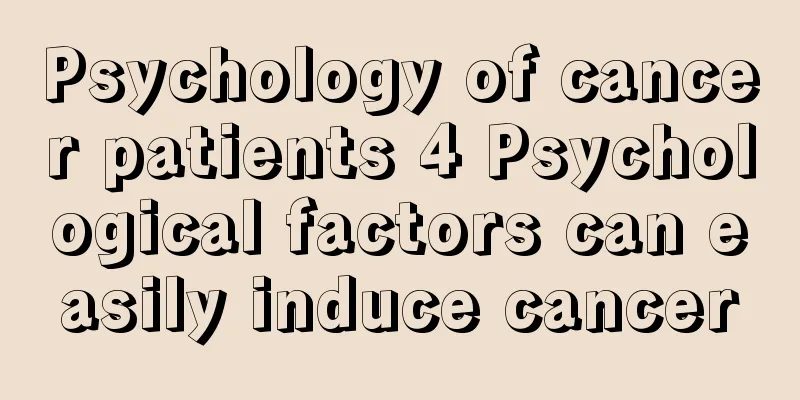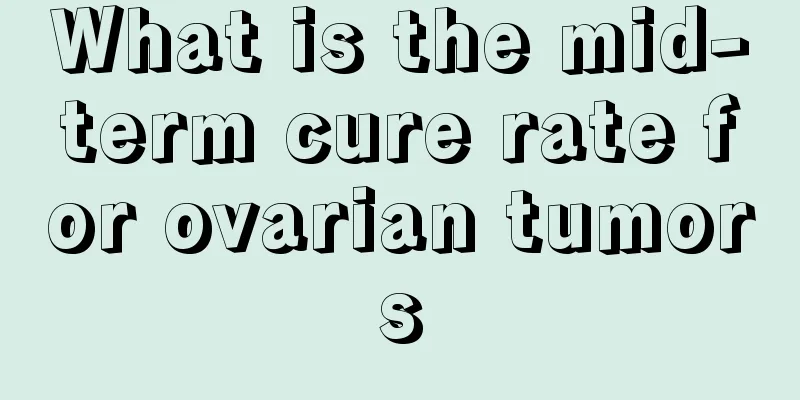Psychology of cancer patients 4 Psychological factors can easily induce cancer

|
Cancer is a very scary disease. Many factors in life may cause people to develop cancer, including psychological factors. So what are the psychological factors that easily lead people to cancer? What is the relationship between mental health and cancer? Let's learn more about it together! (1) Negative emotion accumulation theory There are two types of this. Further analysis found that "accumulation of negative emotions" can only be said to be one of the highly risk factors that promote the occurrence of cancer. The first type is severe setbacks in childhood. Lesen and Gassman found in different types of cancer patients that they all had severe setbacks in childhood, especially the loss of family affection, accompanied by extreme hopelessness. Later, LeSen described a typical development pattern of cancer patients: It starts with the death or departure of one of the parents in early childhood, which leads to the accumulation of negative emotions such as punishment and loneliness, feeling socially excluded, and emotional instability. Later, as life accumulates, the child maintains and deepens this sense of disconnection. The second type is the hopelessness of the elderly. The accumulation of negative emotions over the years eventually leads to the appearance of signs of cancer. For example, a study by Graham et al. showed that among 477 cervical cancer patients, they did have traumatic events within 5 years before diagnosis. (2) Bereavement This theory is similar to the theory of accumulation of negative emotions. Many studies have shown that the death of a loved one is an important factor leading to cancer. Therefore, some people have proposed the concept of "bereavement". However, some scholars believe that it is not the accumulation of negative emotions or the loss itself, but the individual's psychological response to the loss event (that is, the intensity and nature of the grief process) that plays a role. In other words, loss is just a psychological stressor, and negative emotional reactions are the key. This is supported by some experimental results. For example, using sound and light to stimulate animals can make them feel nervous and anxious, which will greatly weaken the defense capabilities of the animal's immune system and induce cancer that was previously dormant in the chest. Therefore, it can be said that negative emotions are activators of cancer cells. (3) Depression theory Among negative emotional reactions, those most closely related to cancer are depression, intense frustration, hopelessness and helplessness. Some people believe that "depression catalyzes tumors." Research by Shekelle et al. showed that people with severe depression tendencies have a three times greater risk of dying from cancer than the control group. A recent 13-year study by Johns Hopkins School of Medicine in the United States also revealed that among 2,017 women, those with severe depression were more likely to develop breast cancer and had a worse prognosis after developing cancer. (4) Personality Theory The relationship between personality and tumors has always been valued. Temoshok conducted a survey on 150 patients with malignant melanoma and concluded that these patients had a personality trait called "Type C personality." It manifests itself as excessive patience, conflict avoidance, excessive cooperation, submission and concession, control of negative emotions, pursuit of perfection, efforts to suppress oneself, and poor expression of emotions. There are many characteristics of psychosomatic reactions caused by type C personality. Among them, what is noteworthy is that it causes the decline of DNA self-repair function at the molecular level and promotes the transformation of proto-oncogenes. At the same time, type C personality changes the function of the neuro-endocrine system, causing the body's immune function to decline, thereby losing the ability to completely eliminate cancerous cells, ultimately leading to the occurrence of cancer. Studies have found that the incidence of tumors in people with type C personality is more than three times higher than that of the general population. However, this is still controversial. As Schwarz (1994) pointed out, the above view cannot be established because the causal relationship is difficult to confirm. Our clinical observations also support Schwarz's judgment, believing that it has not yet been confirmed that type C personality is a risk factor for a high incidence of cancer. |
<<: Revealing the 10 bad attitudes that can accelerate aging. How many of them do you have?
>>: What is the difference between cerebral infarction and cerebral infarction
Recommend
Are radiation protection suits really useful?
As we all know, anti-radiation clothing is a must...
What are the hazards and complications of cervical spondylosis?
Cervical spondylosis is an extremely serious dise...
Is it more painful to remove the dental nerve or to extract the tooth
Dental nerve removal, also known as root canal tr...
What are the methods for students to improve their memory
It is very common that many children encounter pr...
What to do with a dry nose? 7 tips for taking care of it
In the dry environment of winter, or in condition...
Symptoms of advanced indolent lymphoma
Symptoms of advanced indolent lymphoma: The so-ca...
Will irregular menstruation lead to infertility?
Every girl has a different physical constitution,...
The effects and hazards of magnetic therapy sweatpants
Magnetic therapy is an artificial magnetic field ...
What are the benefits of eating watermelon with salt?
Watermelon is a summer fruit that is huge in size...
The symptoms of painful urination are manifested in these three aspects
Dysuria is a common sexual disease that can occur...
What should I do if my throat hurts from smoking too much?
Zhou Yan can have a great impact on the throat, c...
How to diagnose hair folliculitis? Be careful if these situations occur!
Folliculitis is a common skin disease in life. Th...
Can Xiaochaihuang Granules for Children treat respiratory tract infections? Are there any side effects
Children often suffer from upper respiratory trac...
Symptoms before death from ovarian cancer include menstrual disorders
Symptoms before death from ovarian cancer mainly ...
How to prevent colon cancer
When we suffer from colon cancer, it will be part...









